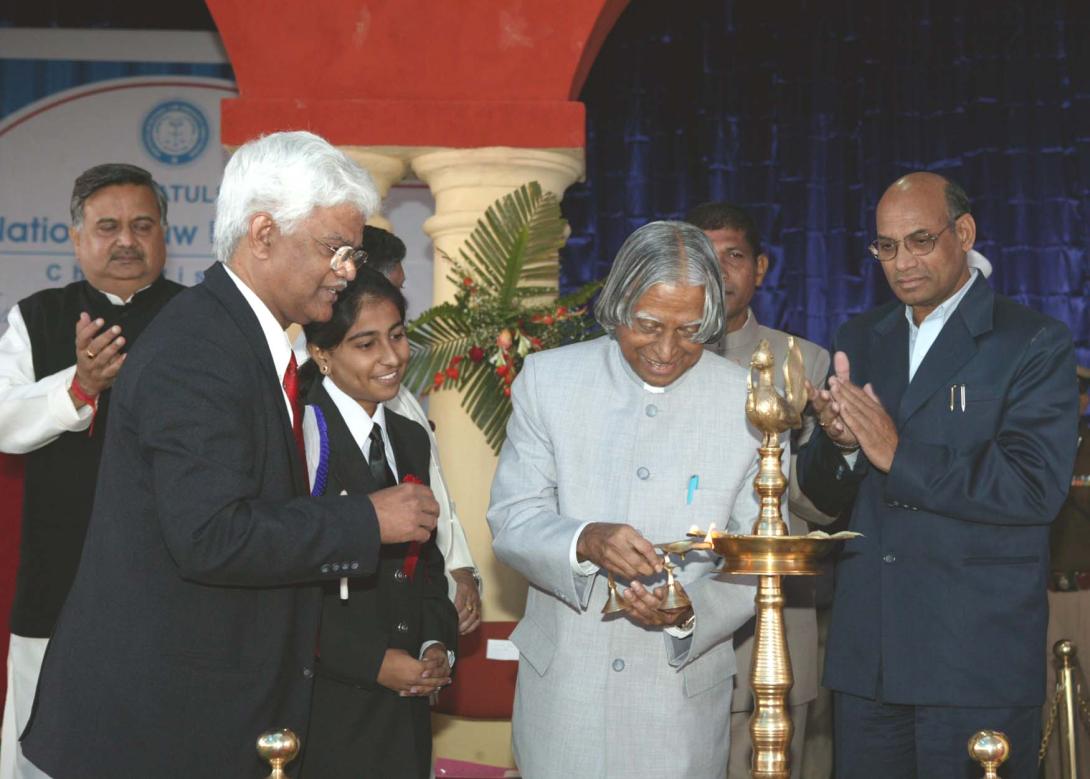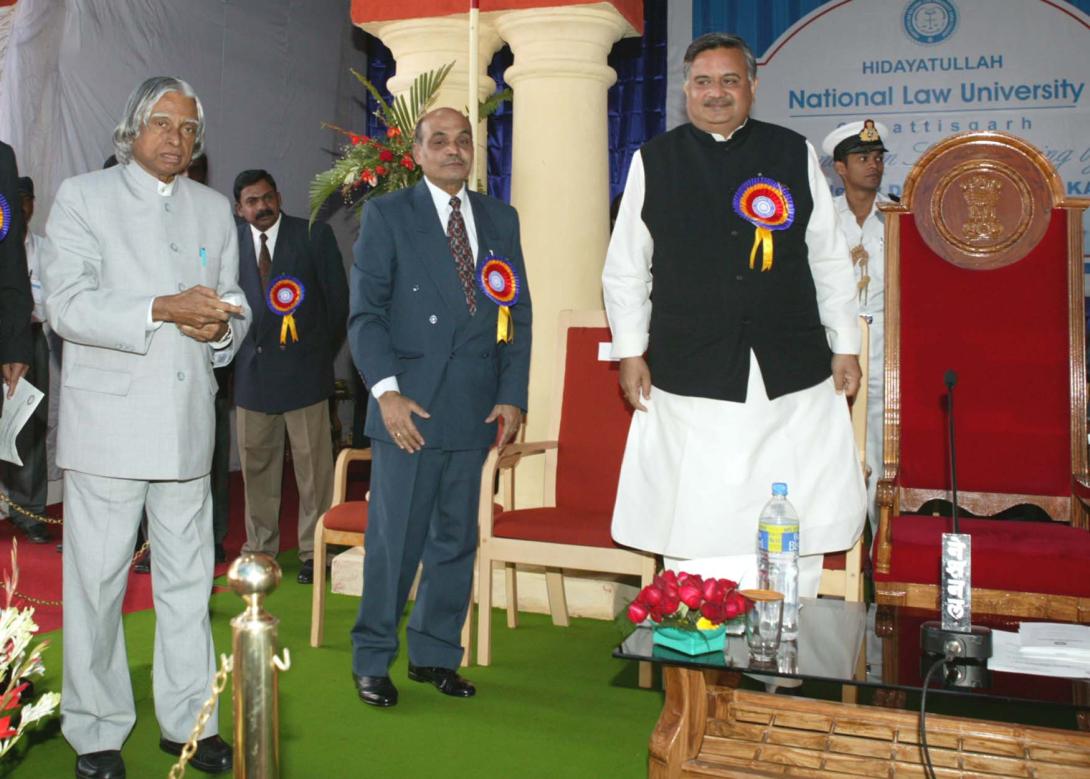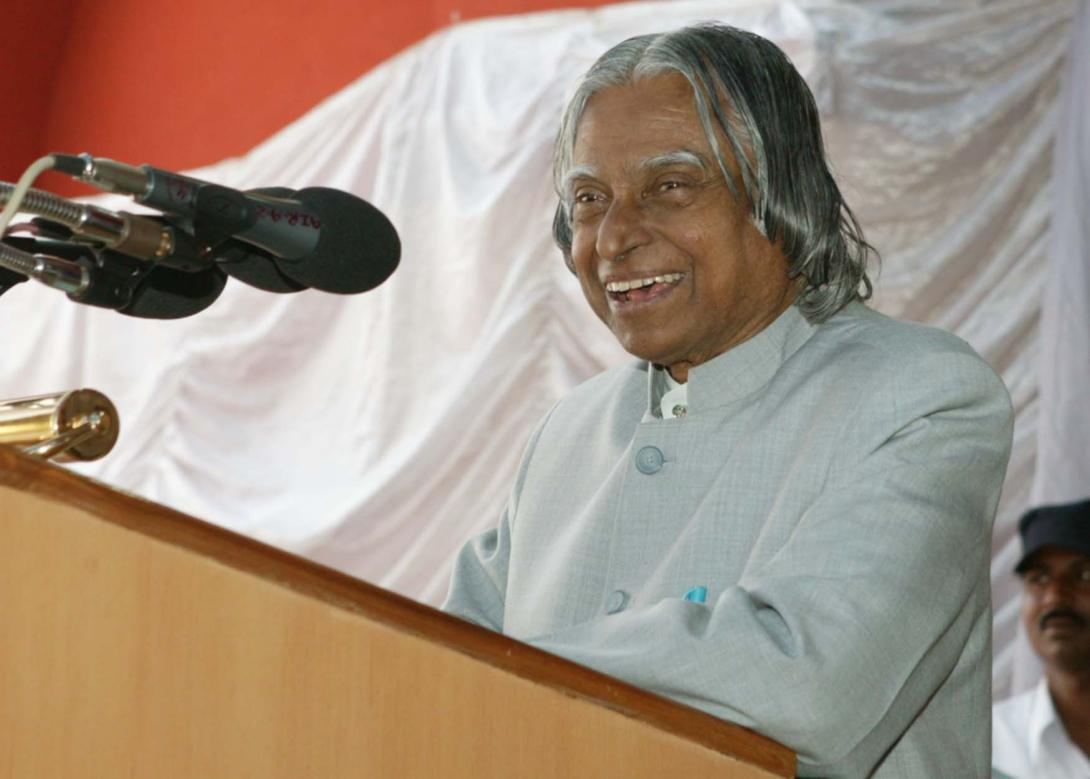Address at the Hidayatullah National Law University
RAIPUR : 28-01-2004
JUSTICE WITH NOBILITY
I am delighted to be with all of you today at the Hidayatullah National Law University. I extend my greetings to the Chancellor & Chief Justice of the High Court of Chhattisgarh, Vice Chancellor, distinguished faculty members and students of the University.
When I am standing in front of you, a scene appears before me ? a scene from our first independence movement, from 1857 to 1947, we were fighting for our freedom for 90 years. The leadership for the first vision of the nation, that is independence, was nurtured by the lawyer community. There were several leaders from law. They were all practicing lawyers when they were fighting for independence. Law and Independence movement made them great leaders of our nation. Today, it is known that our judiciary, apart from its regular judicial work, has led to action oriented decisions for protecting the green environment of our country and also a few long term programs for national development. Time has come to start the second movement. A movement against poverty, a movement against corruption to protect the rights of every citizen of our country and to ensure proper sharing of national resources. I am giving you a call for a mission to make the nation corruption free. Removal of corruption will be an important foundation for our nation. If we cannot eliminate corruption, and make transparent governance, the vision to become a developed India by 2020 will be a remote dream. In short, I am asking the judicial community to start a nationwide movement to form a corruption free India, just like your fore-fathers who started the movement for independence. It is essential judiciary itself should become the torch bearers of nobility and become the role model for citizens particularly the young. Nobility is the foundation of the legal system and it is the responsibility of every component of the legal system to preserve it.
The universality of Law
Law and judiciary have a very crucial role to play in the development and evolution of a society. Law essentially plays the balancing role by resolving conflicts and ensuring justice and fair play when new opportunities and challenges are opening up in the developing society. For example, in Chattisgarh, there are forest related crimes. While suggesting punitive action against offenders, we should evolve laws which will provide alternative source of livelihood for those people who are affected by these laws. In the earlier phase of Indian history, the laws formulated were basically catering to maintain the then prevailing social order, good morality and upliftment of all segments of the society. Later, the spirit and tradition of democracy which was present at the grassroots of Indian society, paved the way for establishing the supremacy and paramount importance of the rule of law. It is on this foundation that our democracy has flourished. Law has been viewed by us as an instrumentality for the good of the people and the well-being of the society. With time, the social system has gradually become more and more complex. In the present period, such complexities have further grown rapidly with modern industrialization, surge in population and resultant increase in scarcity of natural resources, providing new challenges for the legal system.
Today we have well-conceived laws in areas which were earlier unheard of. Some of them were unimaginable in the previous centuries. We already have Laws of the Sea, Laws of Air and Laws on Environment. The Intellectual Property Laws and Cyber Laws are getting refined. New scientific and technological knowledge like bio-technology, brain research, sensors and high performance computing systems have come into operation; laws to balance the interest of the people of today and the technological progress have to be brought about. We must remember that in the case of human institutions, the roots of the present is submerged in the past. This holds equally true for law and legal institutions. Law is not a static body of rules but is an organic body of principles capable of growth and evolution. But for any law to be universally acceptable it must rest on the premise of common welfare. I would request you, young graduates, to keep this in mind while you are on the threshold of entering into this legal profession.
Freedom to Live
One of the important characteristics of democracy is tolerance for criticism. Analysis of criticism leads to understanding of truth. Normally only criticism brings reality. Based on my visits to many parts of the country and exposure to the field problems, I find that there is a need for faster economic development in certain States. If committed people have to work selflessly, we have to ensure their safety without which their families and brethren will not allow them nor want them to work in such an uncertain environment. Freedom to move, freedom to think and freedom to express are ingrained in the freedom to live; it is also enshrined in our constitution. We cannot have inter-state barriers or inter-regional curbs that would snap the thread of unity. Appropriate legal protection for such actions is needed to create a conducive atmosphere for unhindered progress of developmental activities.
Majesty of law and justice
Every citizen in the country has a right to live with dignity; every citizen has a right to aspire for distinction. Availability of a large number of opportunities to resort to just and fair means in order to attain that dignity and distinction, is what democracy is all about. That is what our Constitution is all about. And that is what makes life wholesome and worth living in a true and vibrant democracy.
At this point, I would like to remind all of us that at social levels it is necessary to work for Unity of Minds. The increasing intolerance for views of others and increasing contempt about ways of lives of others or their religions or the expressions of these differences through lawless violence against people cannot be justified in any context. All of us have to work hard and do everything to make our behaviours civilised to protect the rights of every individual. That is the very foundation of the democratic values, which I believe is our civilisational heritage and the very soul of our nation.
Laws driven by national priorities
Opportunities for rapid industrial and economic growth today co-exist with new problems arising out of trade competition and corporate mergers and take-over. Many multinational companies have started their industries in our country particularly ICT area. Many tiny and small sectors of industries and even artisan goods will be facing the forces of modernization in the form of market forces, technologies and other forms of public information system including advertisements. There are major issues of protecting the local and global environment. Let us look at science and technology which has emerged as a strong force during the current period of human history. Basically science and technology is driven by human curiosity and reasoning and in its best sense aimed at spreading benefits to all people. They are basically universal in outlook. Similarly, laws are meant to protect people, their rights and make them feel secure in the society. I think this is the common meeting ground of Law, Science and Technology, People and Society. Legal instruments must maximize the benefits for our people and nation. Laws must protect the indigenous technologies and trade to the extent they impact peoples living and their welfare as well as ensure national interest.
Legal community must play the balancing role so that our technological growth can continue to be beneficial to our people and nation, free from undue interferences or unfair practices by any party with vested interests, domestic or foreign. Industrially developed countries are trying to make laws and treaties to protect and promote their own national interests and priorities, instead of working for win-win partnerships. India should work for win-win situation even in business and trade with ethics.
Information based legal advisory
We have to start use of Information and communication Technology (ICT) in legal dispute resolution at the grass root level. I understand that there are a very large number of civil and criminal cases under the consideration are accumulating particularly in High Courts and District Courts. Pending cases in various courts leads to enormous mental stress, agony, hatred, loss of transparency and huge loss of earning & wastage of manpower and delay in the progress of national development. ICT tools can be used to create an electronic advisory system to assist the public / local agencies as reportedly made available in healthcare through Internet. Legal Mentoring and revitalizing village panchayat system through electronic connectivity to the Courts by using ICT will create human rights awareness among the common public.
Cyber Law
Economic prosperity by 2020 will also mean that many of the Indians will be doing business in the digital world on the web. In this new era, crime, law and justice will be completely different from the present. In the present law, for example, the jurisdiction will correspond to the location where the crime is committed and where the damage occurs - very often both being the same location. Whereas in the digital world, the crime may originate from a strange place even outside our own shores and may damage organizational wealth which will be in the digital form in multiple locations. In the 20th century, a nation's business transactions and wealth creation were based on transfer of materials (atoms) from one place to the other. In the 21st century wealth is created whenever information in the form of electrons is transferred across the networks in a borderless world. Indian judicial system has to build its capacity to define jurisdictions in a way that any crime committed against India or her assets by anyone from anywhere shall be punishable by Indian law. It may be true for other countries also. The legal community must enable formulation of progressive and innovative laws for the digital economy that will be one of the vital components of a developed nation.
Conclusion
India is interested in bringing about global peace and development of the whole mankind - the present six billion people is likely to rise to about eight billion by 2020. Every human being in this planet has the right to live with dignity and has a right to aspire for distinction while retaining one's unique identity. The test of any legal framework depends on its capacity and efficacy to ensure social, economic and political justice for an individual not only in his individual capacity but also as a member of a nation or as a member of the global community. In other words, our individual and localized interests have to be harmonized within the larger pluralistic order so as to give primacy to human rights. It is necessary to work towards Unity of Minds. It is citizen's responsibility to do everything possible to make our behaviour civilized to protect the rights of every individual, without stamping out their individual characteristics and basic identity. For a peaceful human life, law and justice have to assist. If justice fails to protect human rights, the nation fails. It is the responsibility of each component of legal system to ensure that these elements of rights, justice, liberty, equality and fraternity become available to all.
I would like to suggest that the University can consider generating a data-base of a few typical criminal judgements and civil judgements from High Courts and Supreme Court. Students, faculties and experts can together hold discussions to analyse and debate the effect of these judgements on the individual, society and national development. I consider that this practical experience will re-inforce the knowledge base of future lawyers and legal experts and empower them to excel in their profession. When students complete their academic course and go out of the university, they carry with them a certain value system imparted by the teachers and the environment of the university, apart from the expertise in the field of law. I am sure, with knowledge, proficiency professional integrity and nobility, the students of this University will achieve success in all their righteous endeavours. I am reminded of a divine hymn which reads as follows:
Where there is righteousness in the heart,
There is beauty in the character.
When there is beauty in the character,
there is harmony in the home.
When there is harmony in the home,
There is order in the nation.
When there is order in the nation,
There is peace in the world.
It is a beautiful connectivity between heart, character, nation and the world. In a society we have to build righteousness among all its constituents. For the society as a whole to be righteous we need creation of righteousness in family, righteousness in education, righteousness in service, righteousness in career, righteousness in business & industry, righteousness in civil administration, righteousness in politics, righteousness in government, righteousness in law and order, righteousness in justice.
My best wishes to all of you.



